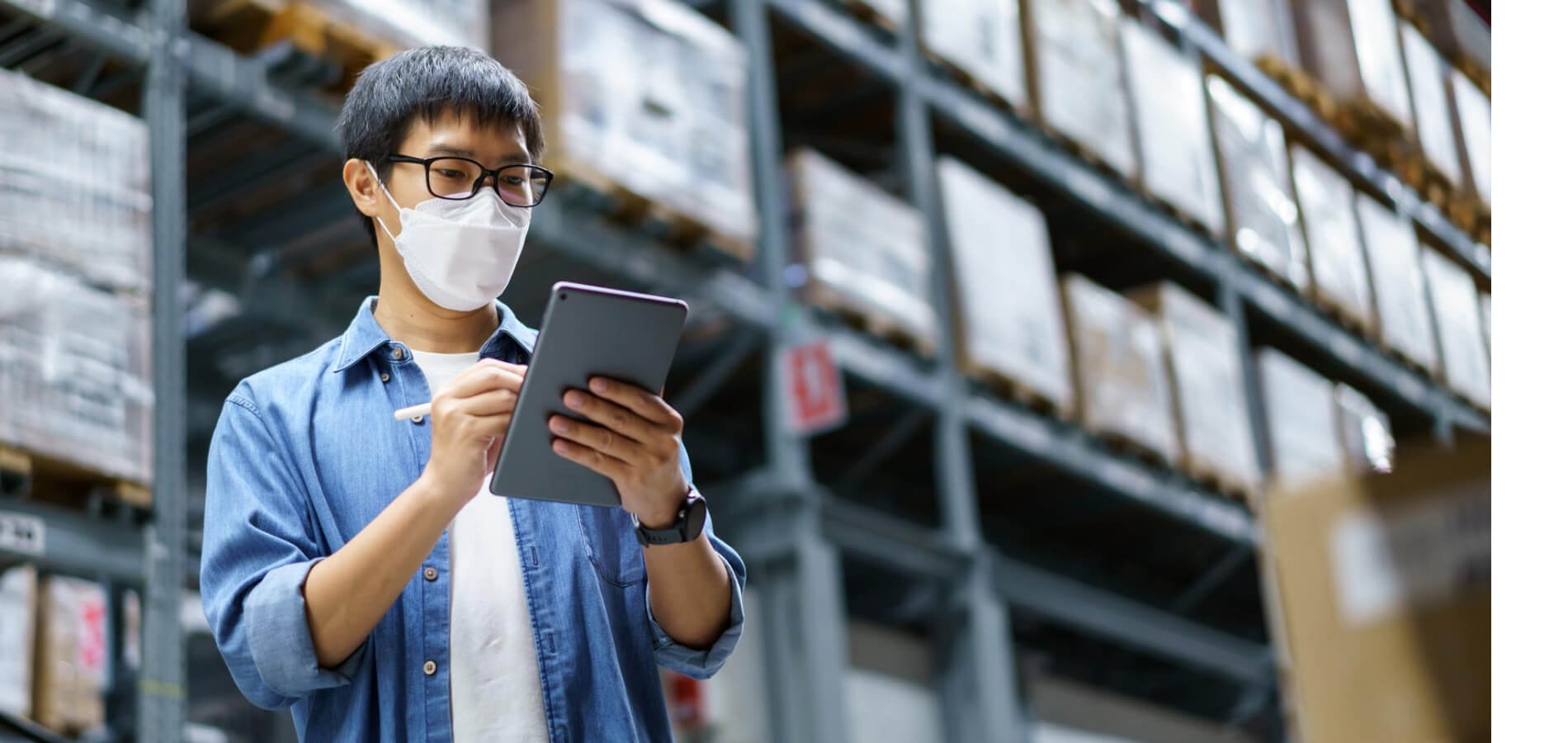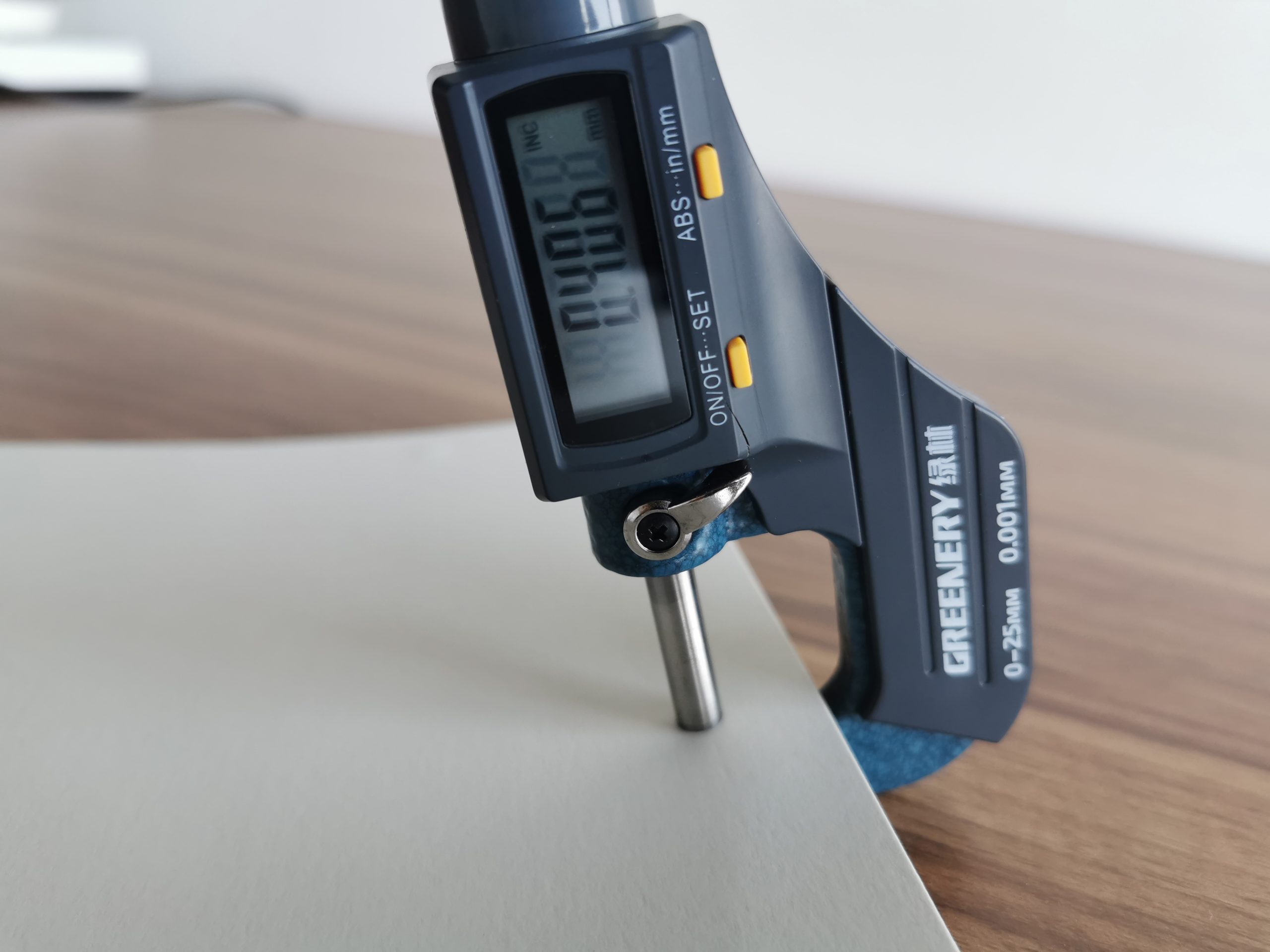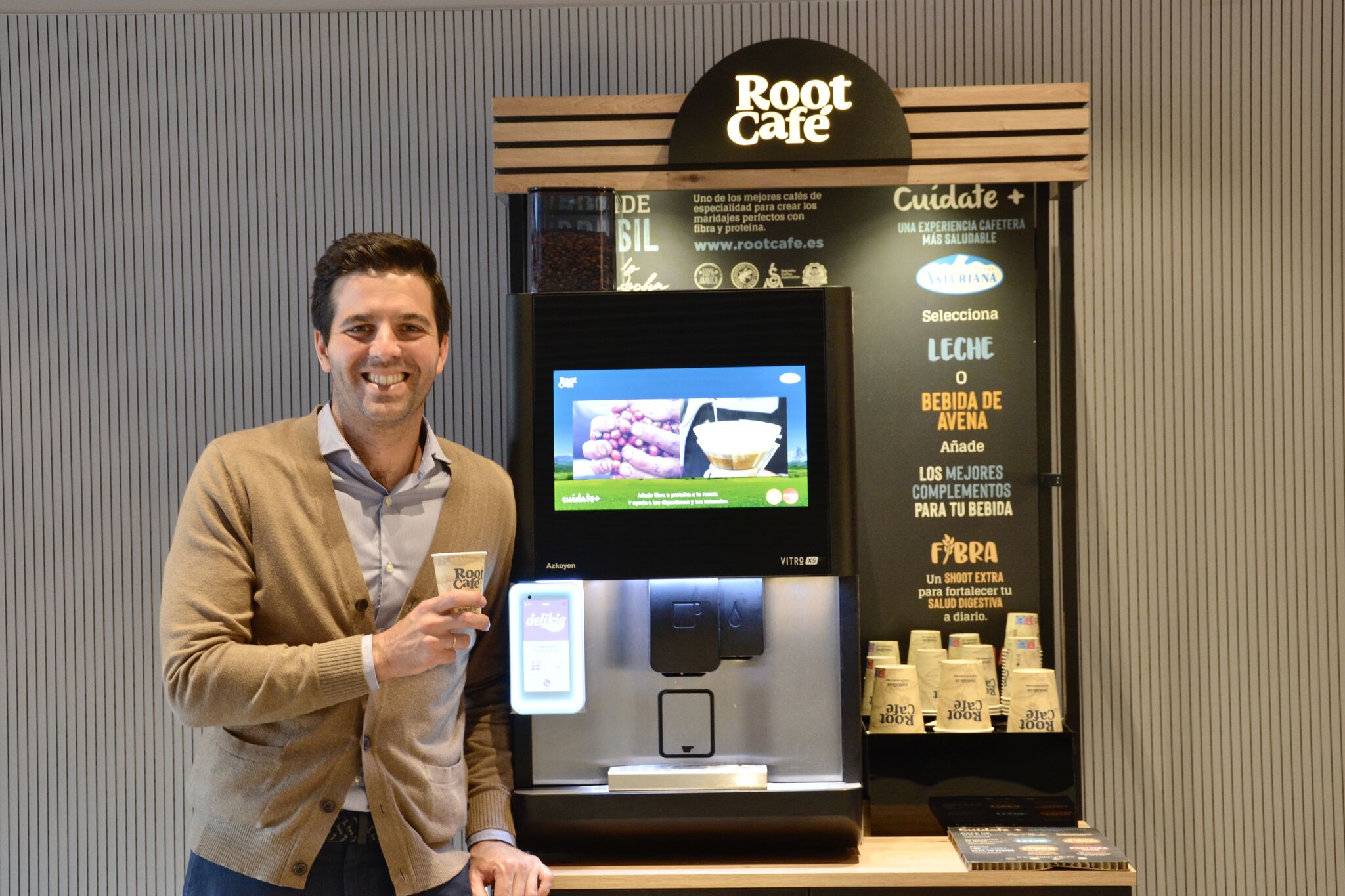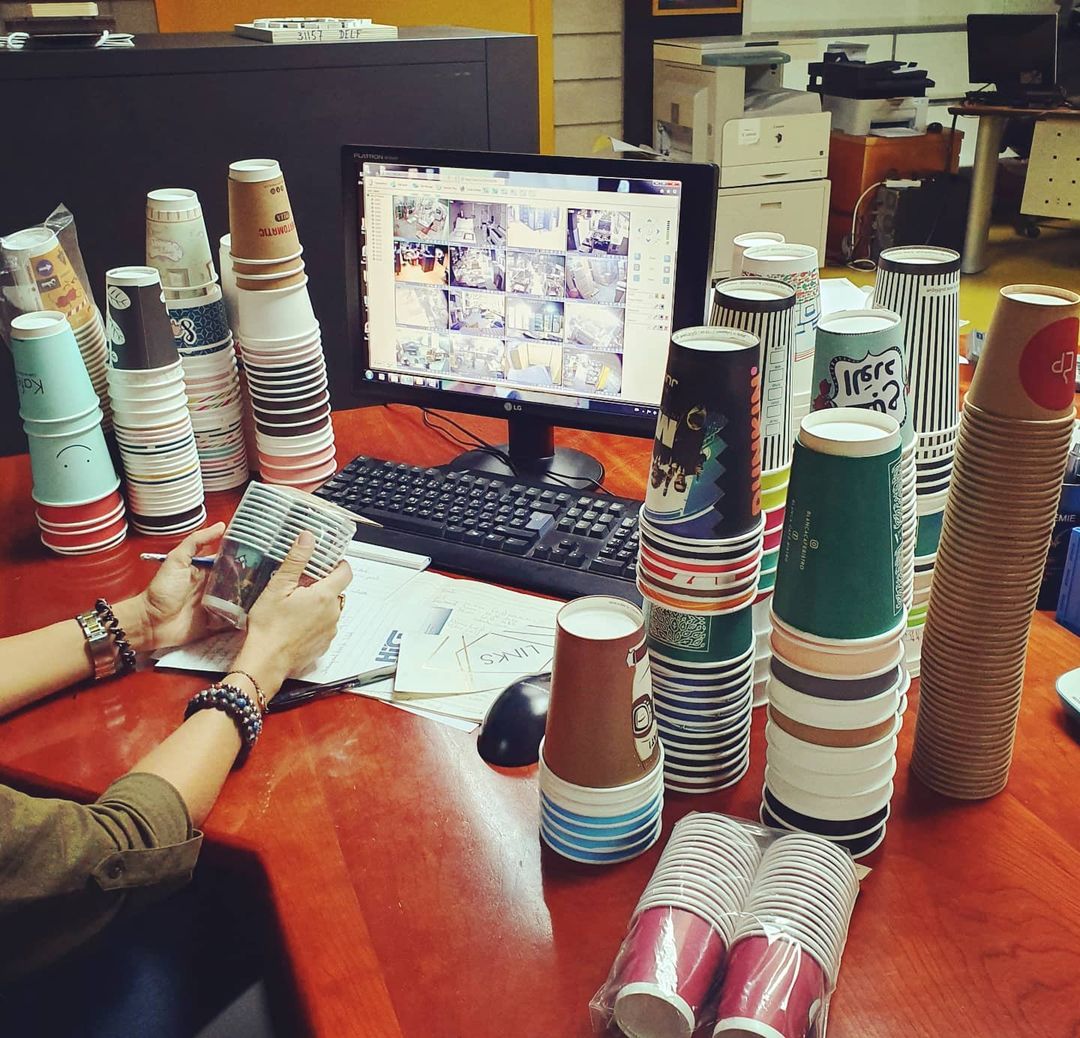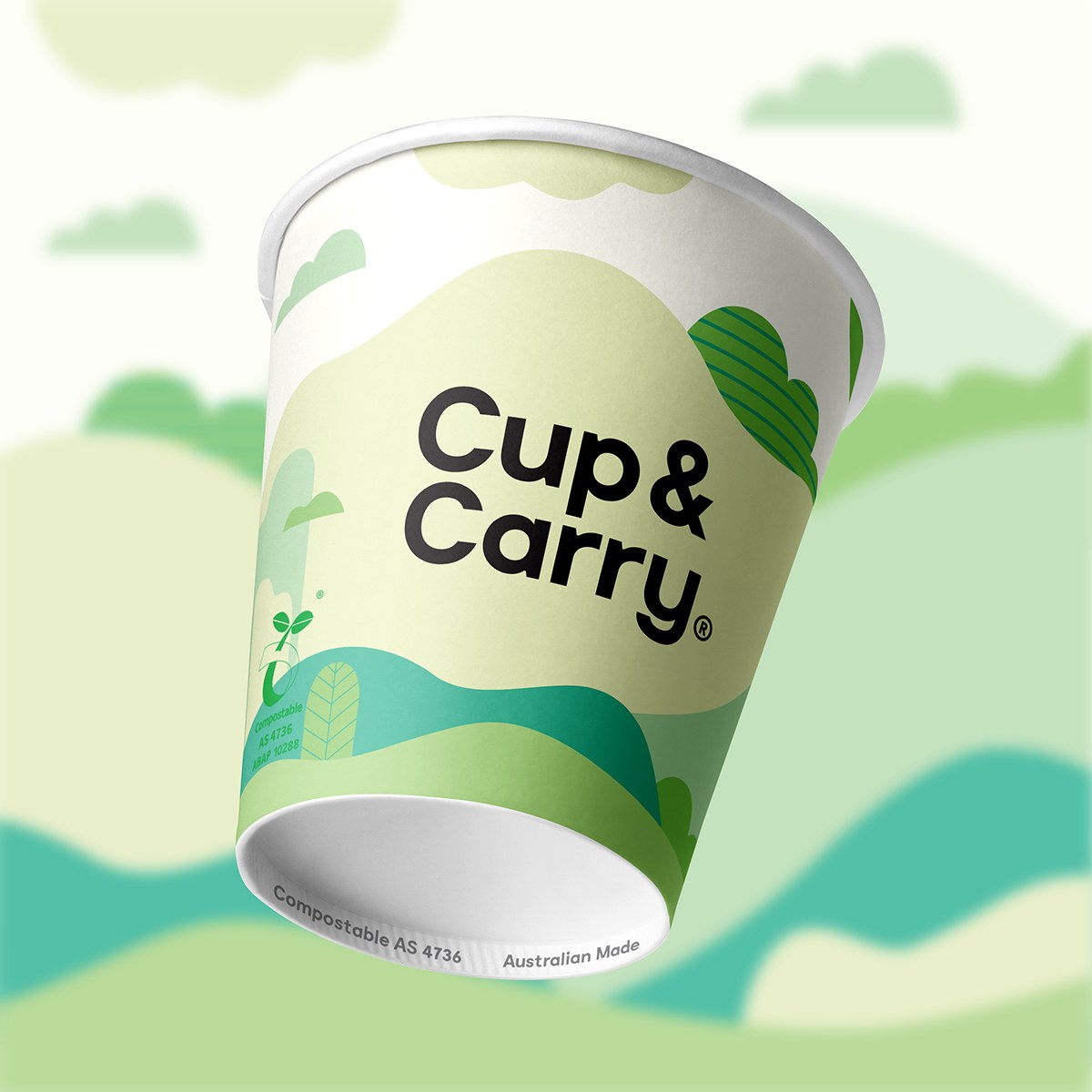When negotiating and communicating with your seller in international trade, you will undoubtedly use trade terms such as EXW, FOB, CIF, and so on. These three-letter incoterms may overwhelm you. Because you have no idea what they mean when it comes to shipping, what you and the seller are responsible for, and which one to choose from among so many incoterms.
In practice, the use of Incoterms in international trade is also flexible. When you and your seller sign the contract, adding one more seller’s responsibility may cause the contract to shift from one term to the next.
You’ve come to the right place if you’re looking for a comprehensive guide to Incoterms 2020. The following aspects will help you understand trade terms:
What is Incoterms 2020 in International Trade?
Incoterms stands for International Commercial Terms and was published by the International Chamber of Commerce (ICC). There are various trade modes in global trade. Buyers and sellers have different obligations in each mode, resulting in different product quotations. Incoterms provide a unified international explanation for these modes.
It specifies the tasks, costs, and risks that buyers and sellers must bear in each mode. Thus it explains the price composition, such as whether shipping costs, insurance fees, and so on are included in addition to the original product price. Incoterms are thus also known as international trade terms, price terms, shipping terms, and delivery terms.
You can use them directly when negotiating with your seller as general rules for international trade. It will assist you in simplifying the negotiation process. When disagreements arise, it is also easier to determine who is to blame. That is why Incoterms are essential for your company.
What Are the 11 Types of Incoterms?
The International Chamber of Commerce (ICC) updates Incoterms every couple of years, and the most recent version is Incoterms 2020. It defines 11 different types of trade terms and divides them into rules for sea and inland waterways, as shown in the Incoterms chart below. Then, one by one, we will list and explain them.
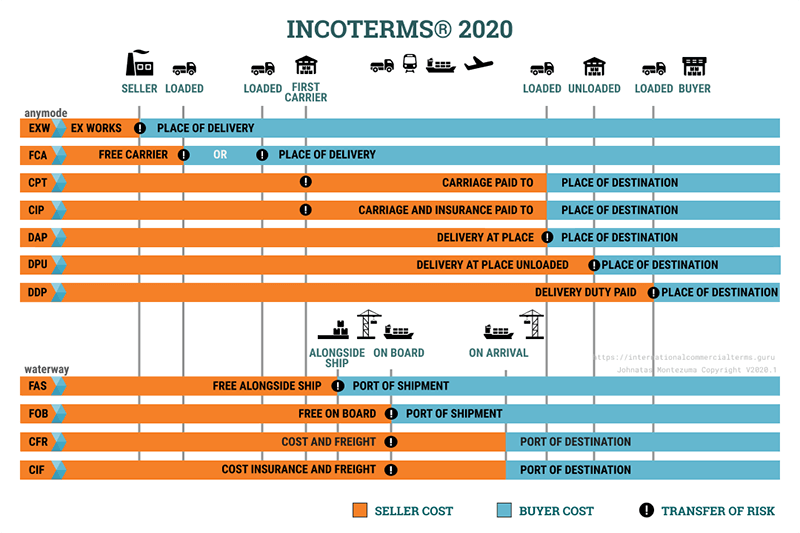
Incoterms for Sea And Inland Waterways
FOB
FOB (Free On Board) is the most commonly used trade term for sea freight. It means that the seller must deliver the goods to the designated port. Following that, the buyer will be held accountable for all tasks, costs, and risks.
Assume you buy and ship your cargo from Ningbo, China to New York, USA under FOB terms. Your seller should then:
- Send your cargo to Shanghai and load it onto the vessel.
- Pay for shipping from his factory to the Port of Ningbo.
- Handle export customs declarations and payment of declaration fees.
- Accept the risks of damage and loss until the goods are loaded onto the vessel.
You will be responsible for the cargo once it is on the vessel. As a result, you must:
- Book shipping space, buy cargo insurance, coordinate all transportation from Ningbo Port to your final destination and pay the shipping costs.
- When goods arrive in New York, they must be cleared through customs, and import duties and taxes must be paid.
- After the goods are loaded onto the vessel, you are responsible for all risks.
Of course, you can delegate shipping and customs clearance to your freight forwarder. This will save you a lot of trouble, especially if you have to go through random customs checks.
Concerning the FOB price, because sellers must pay all expenses prior to sending the goods to the vessel, the following costs will be included in the product quotation:
 FOB Price (Ningbo) = product price + shipping cost to Port of Ningbo + customs declaration fees
FOB Price (Ningbo) = product price + shipping cost to Port of Ningbo + customs declaration fees
FAS
Under FAS (Free Alongside Ship), the seller is not required to assist you in loading the goods onto the ship as FOB, but only to place the goods alongside the ship, in the above example, beside the ship at Port of Ningbo. And you will be held accountable for future risks. Others are identical to FOB. FAS is not widely used.
CFR
If your seller is also responsible for booking shipping space, arranging ship to the port in your country, and paying the freight, the trade term should be CFR (Cost and Freight). In the preceding example, your seller should also assist you in paying sea freight from the Port of Ningbo to the Port of New York. Thus,
 CFR Price (Your closest seaport) = FOB Price (Ningbo)+ sea freight to your port
CFR Price (Your closest seaport) = FOB Price (Ningbo)+ sea freight to your port
CIF
According to CFR, if you also want your seller to assist you in purchasing cargo insurance against damage and loss during transportation, it should be CIF (Cost, Insurance, and Freight).
 CIF Price (Your closest seaport) = CFR Price + Insurance
CIF Price (Your closest seaport) = CFR Price + Insurance
Many buyers wonder about CIF vs FOB. As shown in the price formula, the biggest difference is that the seller should be responsible for the sea freight and cargo insurance.
Notice
Although these four terms are sea freight Incoterms according to the regulations, FOB and CIF are sometimes used for air freight.
Trade Terms for Any Transport Modes
EXW
EXW (Ex Works) indicates that the seller must deliver your cargo to you at his location, such as his factory or warehouse. You will also be responsible for all shipping costs and risks from the seller’s location to your destination. As a buyer, you should undertake the most tasks and risks under EXW.
If your seller’s factory is in Yiwu, for example, you must deal with the export declaration, arrange all cargo transportation from Yiwu to your location in your country, handle import customs clearance, pay import duties, and so on. In addition, you must pay for all expenses incurred during the process. It is also your responsibility if your goods are damaged or lost.
The product quotation you receive is ONLY the original product price because the seller does not have to pay any costs after the cargo leaves his location. There are no additional fees for SELLER.
FCA
Under FCA (Free Carrier), the seller is responsible for delivering your cargo to your carrier (usually your freight forwarder) at any designated location, such as the seller’s factory and warehouse, a road, rail, or air cargo terminal, dock, container yard, and so on. Additionally, the seller should assist you with the export customs declaration.
For example, if you purchase and ship cargo from Yiwu, China, your freight forwarder will pick up your goods at his Yiwu warehouse. Your seller should:
- deliver the goods to the warehouse of the freight forwarder
- handle export customs declaration
- Before delivering goods to your freight forwarder, you must accept the risks.
Your seller will cover all costs associated with the preceding process. However, he will include these fees in the quote in advance.
 FCA Price = product price + shipping cost to the delivery place + export declaration fees
FCA Price = product price + shipping cost to the delivery place + export declaration fees
You should be liable for the goods once they are delivered to your carrier, including all the following tasks, costs, and risks.
CPT
Based on FCA, if your seller is also responsible for arranging shipments and paying freight costs to your destination, it should be CPT (Carriage Paid To). Thus,
 CPT Price = FCA price + Freight
CPT Price = FCA price + Freight
Notice
In fact, the price compositions and responsibilities of buyers and sellers under FOB and FCA, CFR and CPT, CIF and CIP are similar. The main difference lies in different delivery places and when you begin to bear the risk of damage and loss. Therefore, if you ship cargo by sea under FOB, CFR, CIF, correspondingly, you can use FCA, CPT, CIP for air freight.
DAP And DPU
DAP (Delivered At Place) means that the seller is in charge of exporting customs declarations, shipping the goods to the destination, such as your location in New York, and handing over the cargo to you there.
Except for import customs clearance and customs duties and taxes, your seller should bear all shipping costs, other fees, and risks incurred during the transportation process. You must also obtain any customs clearance licenses required in advance, as well as pay customs clearance fees and duties.
Keep in mind that under DAP, the seller is not required to assist you in unloading the goods from the vehicle. DPU (Delivered At Place Unloaded) is the right trade term for you if you need the seller to do that for you.
The only difference between DAP and DPU is whether the seller should unload the cargo at the destination. Others are similar.
DDP
You should use DDP if you want your seller to handle import customs clearance and pay import duties and taxes (Delivered Duty Paid). It is a term used in the door-to-door trade. Your seller will be in charge of all tasks, costs, and risks throughout the transportation process and will deliver your cargo directly to your door. You simply need to assist your seller as needed.
When discussing DDP, we must also discuss DDU (Delivered Duty Unpaid). Although DDU is no longer included in Incoterms 2010 and 2020, it is still widely used in practice. The difference between DDU and DDP is that the seller will not assist you in clearing customs or paying customs duties.
Notice
If you have decided to use one trade term, but still hope that the seller can help you with some things out of his responsibility, you can negotiate with him and entrust him to handle it on your behalf.
For example, according to FOB rules, the seller is not responsible for booking and buying cargo insurance. However, in practice, some buyers will entrust the seller to help with these things, or even use the seller’s freight forwarder.
How to choose EXW, FOB, CIF, And DDP?
The most commonly used trade terms are EXW, FOB, CIF, and DDP. Buyers who are familiar with the exporting country and export customs declaration should choose EXW.
Buyers with some importing experience prefer FOB. They will have their cooperative forwarders handle the shipping from the seller’s country to their final destination.
CIf is better suited to first-time buyers. The seller will assist in shipping the cargo to your country. And dealing with the latter isn’t too difficult for you.
DDP is very popular among eCommerce sellers, particularly Amazon FBA sellers. They allow their suppliers to ship cargo directly to the Amazon warehouse, which is very convenient.
What Are Freight Collect Or Prepaid Incoterms?
As you can see, each incoterm clearly defines who is responsible for shipping costs. We can categorize these trade terms based on whether the seller or the buyer is responsible for international shipping costs.
we can divide these trade terms into:
- Freight collect incoterms (i.e. the buyer pays international freight when receiving the goods at the destination): EXW, FCA, FOB, FAS.
- Freight prepaid incoterms (i.e. the seller pays international freight before shipping): CFR, CIP, CPT, CIF, DAP, DPU, DDU, DDP.
And “Freight Collect” or “Freight Prepaid” will be shown on the Bill of lading.
What Are Inter Trade Terms on Alibaba.com?
Many importers find suppliers and source products from Alibaba, the world’s largest international wholesale platform.
On the product profile, sellers on Alibaba typically display the EXW or FOB price. However, this is only a price reference. You can contact and negotiate with the supplier if you want to know the specific product quotation or other quotations such as CIF price or DDP price.

Furthermore, you may use any of the above trade terms as long as your supplier allows it. For example, if the supplier you find is unable to assist you in obtaining import licenses, handling import customs clearance, and paying customs duties, he will refuse to use DDP.
The Conclusion
I hope this article has helped you understand Incoterms. If you have any questions, please contact us freely.

